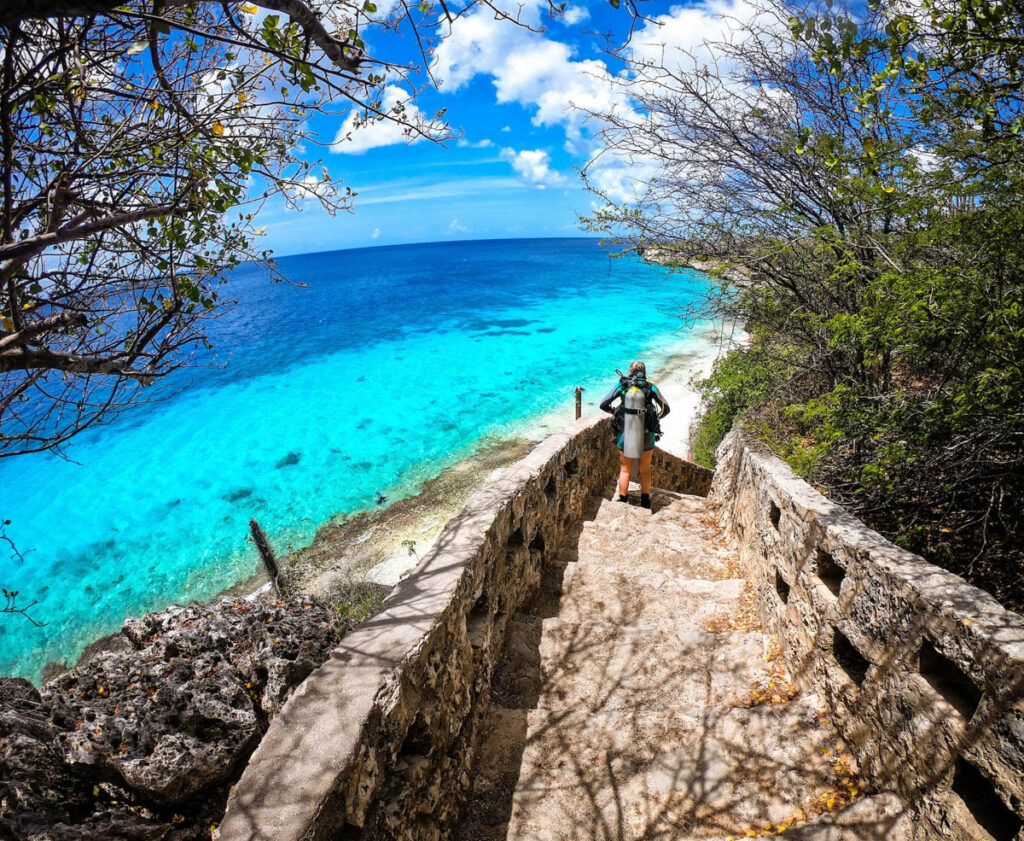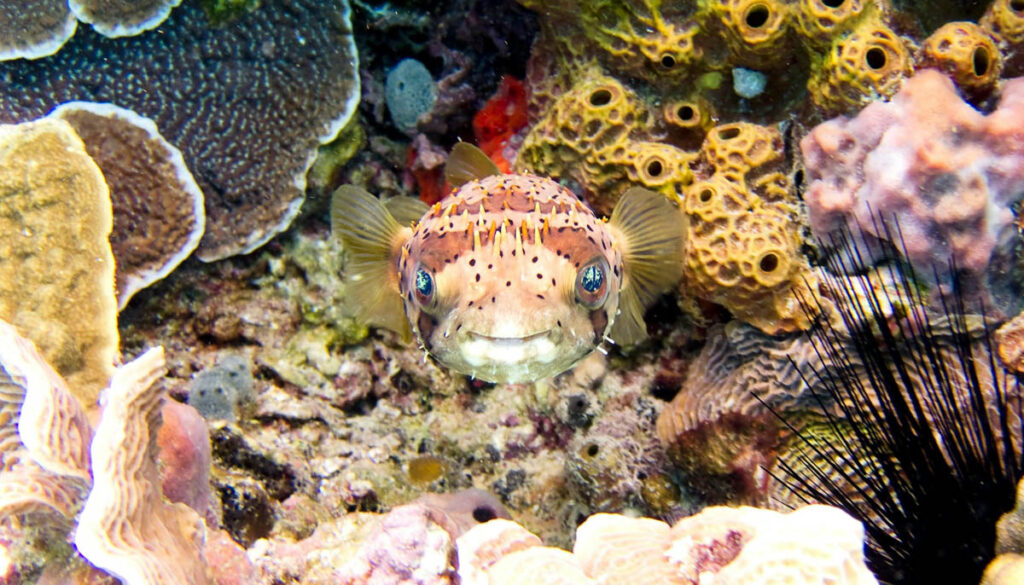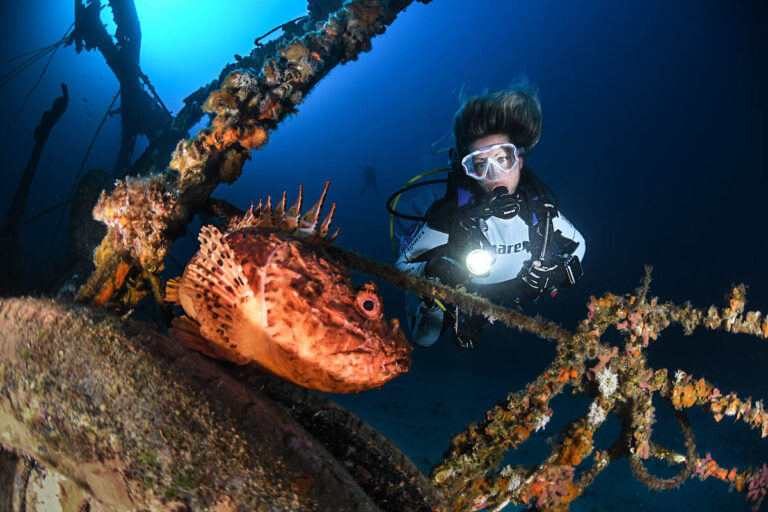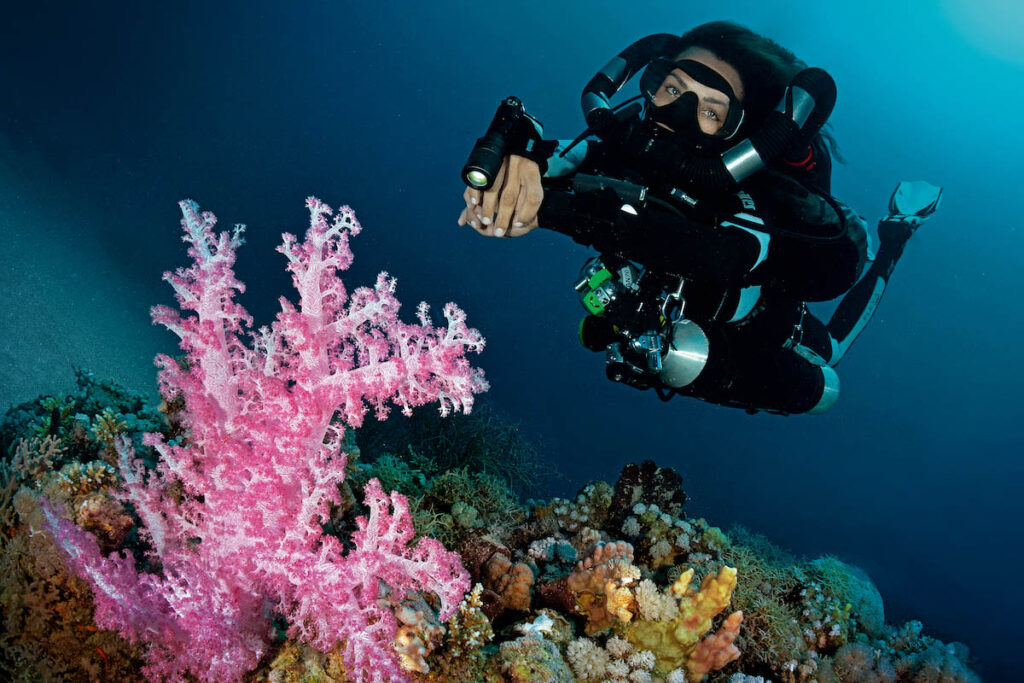Night diving can feel like a leap into the unknown, but it’s an experience like no other. As the sun sets and the underwater world transforms, new marine life emerges, and familiar dive sites take on a whole new dimension. If you’re considering your first night dive but feeling unsure, this guide will help you understand what makes night diving so special, how it differs from day diving, and how you can best prepare for this unique way of diving.
What Makes Night Diving So Great?
Night diving offers a unique opportunity to witness marine life in ways you can’t during the day. While daytime dives showcase the bright colors of coral reefs and schools of fish darting through the water, the nighttime brings out nocturnal creatures like lobsters, octopuses, and moray eels that remain hidden in the daylight.
Your flashlight beam narrows your focus, creating a more intimate and concentrated experience as you move through the water. If you go night diving on a coral reef you have dived during the day, you will find it is a completely different experience.
Day v Night Diving
Night diving isn’t just a darker version of day diving—it’s an entirely different experience with its own set of techniques and highlights. Here are some key differences:
- Limited Visibility: Unlike daytime, where you rely on natural sunlight, at night, your dive light becomes your primary source of visibility. This means your field of vision is much more focused.
- Marine Life: Different creatures come out at night. You’ll see nocturnal animals like crabs, shrimp, hunting reef sharks, and bioluminescent plankton that aren’t as active during the day. Many fish also behave differently, sleeping or sheltering in the coral.
- Navigation: Navigating at night is a different challenge. You’ll use your dive compass more frequently, relying on your dive torch to illuminate your path.
- Calm Environment: Nighttime underwater tends to feel calmer, with fewer distractions. The stillness allows for a quieter dive, often with fewer divers around.
Essential Tips for First-Time Night Divers
If you’re ready to give night diving a try, here are 10 essential tips to get started:
- Get comfortable with day diving first.
Before attempting a night dive, make sure you are fully comfortable scuba diving in the daytime. Having strong buoyancy control, good navigation skills, and familiarity with your equipment will make the night dive less daunting.
- Dive the site in the daytime first.
Dive sites look completely different at night, so get to know the dive topography of your chosen site by diving it in the daytime. Make a mental note of landmarks such as certain rock formations and coral bommies. This will make it much easier to navigate during your night dive.
- Bring a backup dive light.
A high-quality dive light is crucial for night diving. Make sure it’s powerful enough to illuminate your path, and always carry a backup light in case your primary one fails.
- Stay close to your dive buddy.
In the dark, it’s easy to become disoriented or separated from your buddy. Stick close together and use your dive lights to signal each other regularly to ensure you’re both comfortable and safe.
Also, attach a diver’s glow stick to your tanks to ensure you can identify each other among other divers.
- Plan your dive carefully.
Night dives should be planned with extra care. Make sure you choose a familiar dive site or one that is easy to navigate. If you’re concerned about navigating at night, stay shallow and choose a small dive area to explore for the entire dive. Discuss entry and exit points, depth limits, and how long you plan to dive for.
- Descend at dusk.
Dusk is the perfect time to start your night dive. You can get your dive kit ready and do all your buddy checks before it gets too dark. Descending at dusk also allows your eyes to adjust to the increasing darkness and it’s a lot less scary than descending into dark waters.
- Move slowly.
Move more slowly during night dives. This gives you time to spot small or camouflaged nocturnal creatures, and it also helps with buoyancy control in the dark. There is no need to rush.
- Practice signal communication.
Night diving involves signaling in a different way than during day dives. You will use torch signals instead of your hands (or hand signs illuminated by your torch). Agree on a set of signals with your buddy before descending.
- Perfect your buoyancy.
Maintaining neutral buoyancy is even more important at night. Since you can’t always see your surroundings, it’s easy to rise or sink without realizing it. Work on your buoyancy skills before you start night diving and make frequent buoyancy checks throughout the dive.
- Be mindful of marine life.
Don’t shine your light directly at marine creatures, as this can disturb them and alter their natural behaviors. Instead, use the edge of your beam to observe animals without affecting them.
- Keep calm and enjoy the experience.
Night diving might feel intimidating at first, but once you adjust to the dark, it can be incredibly peaceful. Trust your training, stay calm, and focus on appreciating the unique beauty of the underwater world at night.
Top 5 Places to Try Night Diving
If you’re ready to experience the magic of night diving, here are five top destinations where you can make your first plunge into the dark:

Photo by Pascal van de Vendel on Unsplash
- Sharm El Sheikh, Egypt.
Known for its crystal-clear waters and thriving marine life, diving in Sharm El Sheikh is perfect for your first night dives. There are shallow coral reefs just off the beaches, home to countless nocturnal creatures, making it an ideal spot for beginners. The reefs are very active at night, and surfacing to see Sharm El Sheikh’s waterfront lit up at night is a beautiful experience.

Photo by Johnny Africa on Unsplash
- Bonaire, Caribbean.
Bonaire is renowned for its easy shore diving and calm conditions, making it perfect for first-time night divers. The waters there are protected by the Bonaire National Marine Park, one of the oldest marine reserves in the world, and are full of life. Bonaire’s reefs come alive after dark with octopuses, eels, and bioluminescent creatures.
- Kona, Hawaii.
Diving in Kona is famous for its night dives with manta rays. These majestic creatures glide gracefully through the water as they feed on plankton attracted by divers torches. It’s a truly unforgettable experience.

- Cozumel, Mexico
Cozumel’s night dives are some of the best in the Caribbean. You’ll spot crustaceans, eels, and other nocturnal marine life in the vibrant coral gardens here. Cozumel diving is perfect for all experience levels, including beginners who have just earned their diving license.
- Koh Tao, Thailand.
Diving in Koh Tao is known for its vibrant coral reefs and abundant marine life, including sea turtles, reef sharks, and whale sharks (March to June). Koh Tao’s calm, warm waters make it ideal for beginners and a great place to try night diving. The island’s night dives are filled with sightings of sleeping parrotfish, hunting moray eels, and bioluminescent plankton.
Useful Courses for Night Diving
To become skilled and comfortable as a night diver, consider enrolling in a dive specialty course or two before you start exploring the ocean at night. A Night Diving course covers all the essential skills you’ll need for diving after dark. It’s a great way to build your confidence and practice under expert guidance.
It’s also essential to have good buoyancy control and navigation skills before night diving, so a Perfect Buoyancy and Underwater Navigation course is also recommended to hone your skills.










